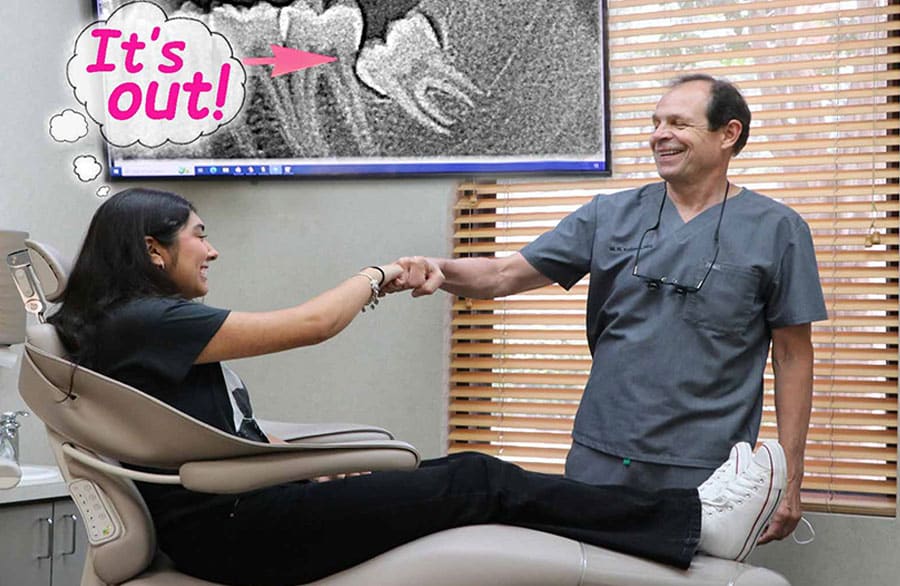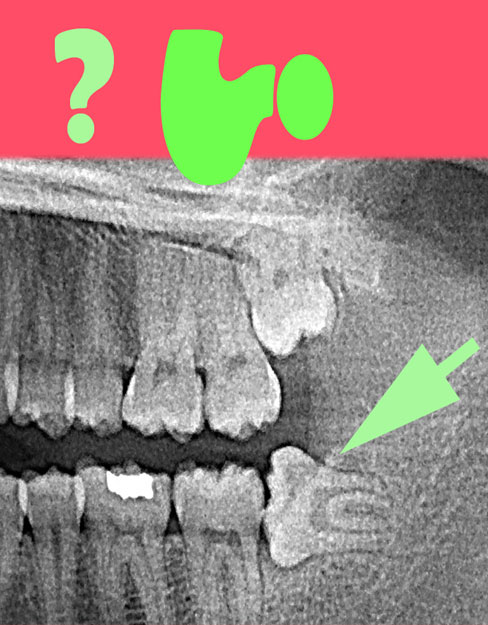Preserving Your Oral Health
Wisdom teeth, called third molars, are the very last teeth to grow into the mouth. They develop in the back of the mouth behind the second molars. In teenagers, impacted wisdom teeth commonly cause discomfort when they erupt through the gum tissue. Rarely, is there enough space it the mouth for these teeth to fully erupt. This lack of room is associated with swollen gums, discomfort and tooth decay. In some instances, wisdom tooth removal is recommended to prevent crowding of the front teeth. Additionally, wisdom teeth impactions can cause tenderness which makes tooth brushing more difficult.
Frequently wisdom teeth should be removed in order to prevent the potential for damage to the adjacent teeth and gums. The ideal time to examine third molar development is between the ages of 14 - 19 years old. Early check-ups can simplyfy any treatment that may be needed. Schedule a consultation with Dr. Roman today to discuss wisdom tooth position and development.
Why Choose Roman Dental for Wisdom Tooth Extractions?


We Accept Dental Insurance

In-House Wisdom Tooth Extractions

Sedation Dentistry Available

What are Wisdom Teeth?
Wisdom teeth are your last set of teeth to grow into your mouth, and they emerge between the ages of 16 and 25. You can be born with no wisdom teeth, or one, two, three, or all four—it all depends on your genetics. In your teenage years, your dentist should be able to spot them and keep an eye on them, determining whether they’ll be impacted below your gumline, are growing in sideways, or whether there will be enough room for them in your mouth.
When Do Wisdom Teeth Need to be Extracted?
The most common reason why wisdom teeth need to be removed is for prevention. If there isn’t enough room in your jawbone for them to grow in, it could increase your chances of experiencing crowding and other orthodontic issues down the road. If they’re growing in sideways or impacted below the gumline, it could increase your risk of developing an infection or experiencing jaw damage. By removing your third molars, you can avoid needing additional oral treatment down the road.


Wisdom Tooth Extraction Process
In most cases, patients are sedated intravenously during the tooth removal process. This makes the treatment very comfortable. Because of the anesthesia, wisdom tooth removal patients have very little memory of the procedure.
Because most third molars are impacted beneath the gum tissue, surgical extraction involves the removal of obstructing bone and suture placement. As a result minor post operative bleeding, bruising and swelling may occur. However, medications are often delivered intravenously, during the time of surgery, to minimize discomfort and inflammation. Afterward, patients are given a cold compress to further limit swelling. Following the oral surgery it's recommended that patients have a light, bland and soft meal with water for hydration. Rest and limited activity provide the most comfort on the path to recovery.
Wisdom Tooth Extraction FAQs
Depending on whether you require a surgical or simple wisdom tooth extraction, it can take anywhere from three days to two weeks to recover. While the actual extraction site will take several months to completely close and heal, for the first two weeks post-op, you’ll need to maintain a soft diet and follow other safety precautions to avoid dislodging the blood clot.
It’s important to note that not everyone requires wisdom tooth extractions, but if you do, it’s best to not put it off, especially if they’re causing you discomfort or pose a threat to your oral health in the future. In addition, patients are often able to make a faster and smoother recovery when the procedure happens while they’re younger.
Your dentist will do everything they can to make sure your procedure is as comfortable and pain-free as possible. Before your extraction, your dentist will numb your mouth, and if necessary, provide you with dental sedation to make sure you remain comfortable through the process. While you may experience some bleeding and discomfort after your procedure, know that this is a natural part of healing. If the pain becomes worse instead of getting better, please call our office.
Our office will provide you with instructions to prepare for your treatment. Typically, these include:
- Arrange for a trusted friend or family member to drop you off and pick you up from your appointment.
- Purchase soft foods and hydrating liquids to sustain you throughout your healing process.
- Wear comfortable clothes to your appointment.
- If you’re receiving IV sedation, please wear a short sleeve shirt, or a shirt that allows you to easily roll up your sleeves.
- Refrain from smoking or using tobacco products before and after your treatment.
Wisdom teeth usually emerge between the ages of 17 and 25. Signs that they need to be removed include:
- Pain at the back of your mouth
- Swelling around the jaw
- Red or swollen gums
- Bad breath
- Difficulty opening your mouth
If you experience these symptoms, consult with Dr. Kotlarek at Roman Dental. He will help you determine if extraction is necessary.
Yes, wisdom teeth can cause sinus issues.
The upper wisdom teeth are located close to the sinuses. When these teeth become impacted or grow improperly, they can place pressure on the sinuses. This can lead to pain, headaches, and congestion.
If you notice sinus problems coinciding with wisdom tooth discomfort, the two issues might be related. An evaluation at Roman Dental can provide clarity and relief.
Not removing impacted wisdom teeth can cause several complications, including:
- Damage to adjacent teeth
- Cyst formation
- Infections
- Gum disease
Impacted wisdom teeth can also result in crowding of other teeth. This may lead to misalignment and the need for orthodontic treatment.
By consulting with Dr. Kotlarek at Roman Dental, you can avoid these risks and maintain optimal oral health.
No, wisdom teeth do not grow back once they are removed. After extraction, the site heals, and the bone eventually fills in the space where the tooth was located.
A dry socket (alveolar osteitis) occurs when the blood clot at the tooth extraction site does not develop, dissolves, or becomes dislodged. When this happens, it exposes the underlying bone and nerves. This condition can lead to severe pain, delayed healing, and potential infection.
You can prevent dry sockets by following these guidelines:
- Avoid Straws and Smoking: These actions can dislodge the blood clot.
- Maintain Oral Hygiene: Gently rinse with a saline solution as directed.
- Adjust Your Diet: Stick to soft foods and avoid chewing near the extraction site.
Swelling is common after wisdom tooth extraction and usually peaks within 48 hours. These tips can help you manage swelling:
- Apply an ice pack for 20 minutes on and 20 minutes off for the first 24 hours
- After the first day, switch to warm compresses to help reduce swelling
- Keep your head elevated when lying down
- Avoid strenuous activity
- Use over-the-counter pain relievers and anti-inflammatory medications
Dr. Kotlarek will provide personalized post-operative care instructions tailored to your specific needs. Carefully following them will promote a smooth and speedy recovery.
Why Choose Roman Dental?
The Roman Dental staff prioritize each patient's unique needs, their age, medical history, and lifestyle are considered when treatment is recommended. This small dental practice located in West Houston provides thoughtful and personalized care.
Dr. Roman Kotlarek is all about clear communication. He listens closely to patients' concerns and thoroughly answers questions. He also discusses treatment options and makes tailored recommendations to meet immediate needs.
Dr. Kotlarek's expertise is backed by memberships in prestigious organizations, including the American Society of Dental Anesthesiology, the American Society of Dental Aesthetics, the American Dental Association, the Texas Dental Association, the International Congress of Oral Implantologists, reflecting his commitment to continuing education and high-quality dental care.








